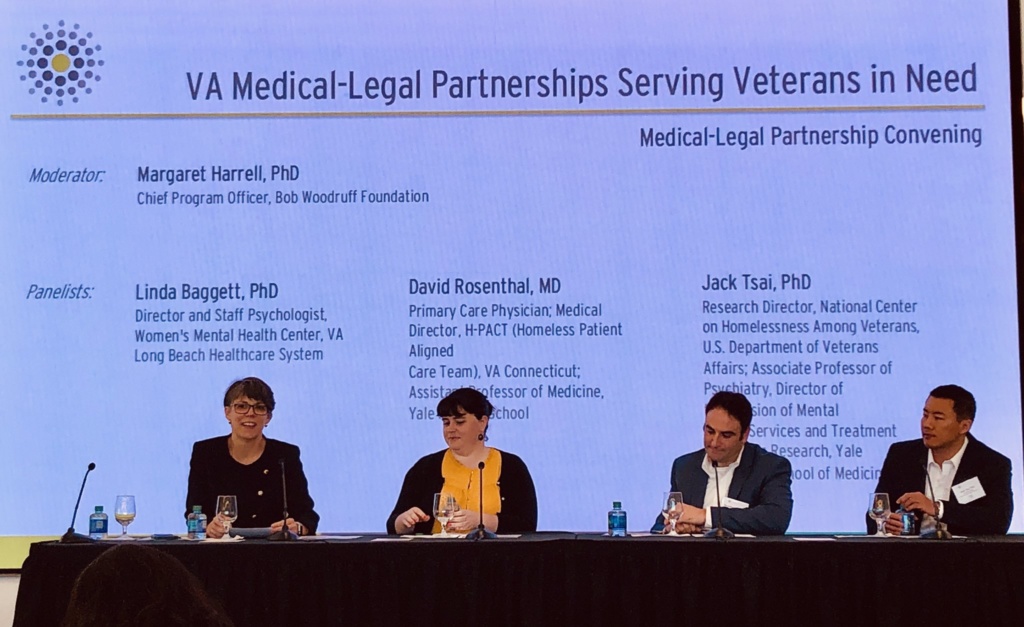As the leading voice for medical-legal partnership, the National Center engages in education, research, and technical assistance to foster a system where all health organizations leverage legal services to better address health-related social needs. Below are a few of the projects we’ve embarked on to create that culture shift.
Hundreds of health care organizations have used our resources to integrate and strengthen medical-legal partnership services at their organizations, and normalize the use of lawyers in their clinics.
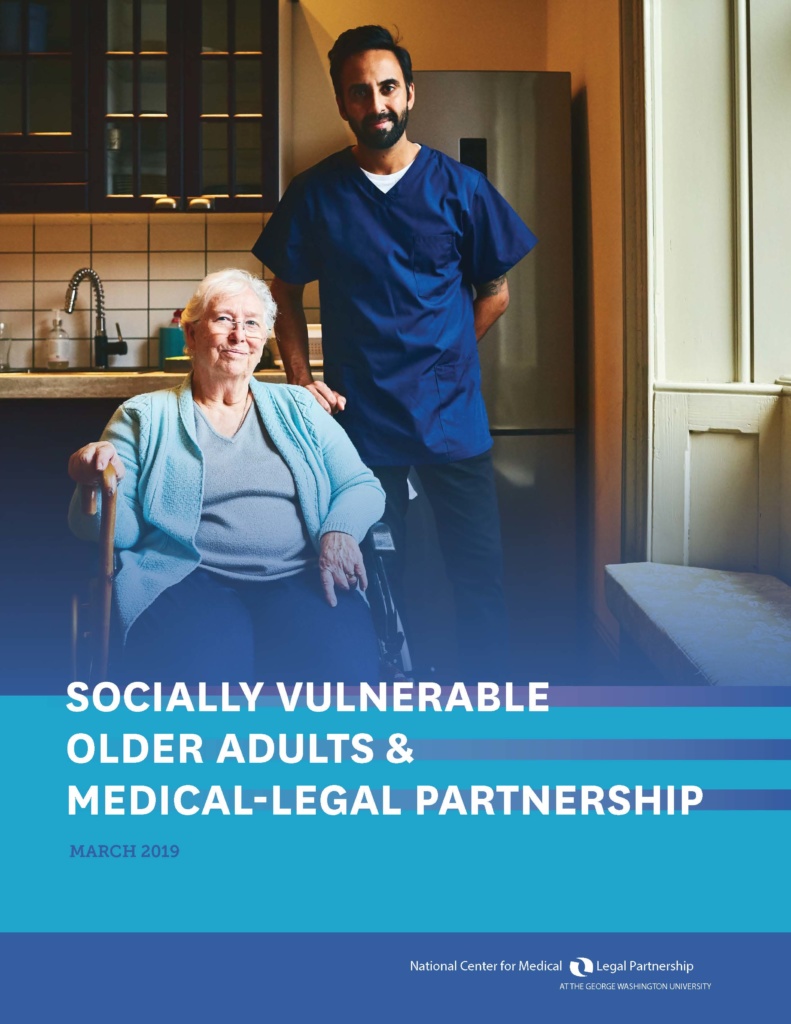 Our tools and publications examine how health care and legal organizations work together to screen and treat patients’ health-related social and legal needs, how this work is financed, and how to overcome structural issues inherent in cross sector work. We’ve released issue briefs on screening, MLP practice, population health, information-sharing, and financing. We’ve also authored reports specifically on the MLP approach in health centers, veteran health care settings, complex care settings, health care for the homeless sites, and school-based health settings. Recently, we’ve published issue briefs examining MLP’s role in addressing the opioid crisis, meeting the needs of socially vulnerable older adults, and providing holistic care for transgender individuals.
Our tools and publications examine how health care and legal organizations work together to screen and treat patients’ health-related social and legal needs, how this work is financed, and how to overcome structural issues inherent in cross sector work. We’ve released issue briefs on screening, MLP practice, population health, information-sharing, and financing. We’ve also authored reports specifically on the MLP approach in health centers, veteran health care settings, complex care settings, health care for the homeless sites, and school-based health settings. Recently, we’ve published issue briefs examining MLP’s role in addressing the opioid crisis, meeting the needs of socially vulnerable older adults, and providing holistic care for transgender individuals.
Working in partnership with large health systems and national experts, we empower healthcare providers with the resources they need to move beyond screening to implementing impactful, system-level interventions that address and prevent health-related social needs.
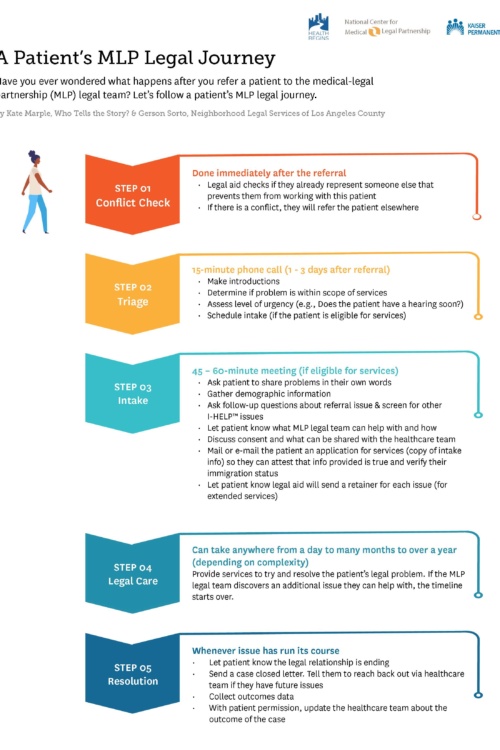
The National Center for Medical-Legal Partnership (NCMLP) is proud to partner with Kaiser Permanente’s national Office of Community Health and HealthBegins on the groundbreaking “Kaiser Permanente Medical-Legal Partnership Initiative,” launched in 2021 to tackle the health-harming effects of housing insecurity. Through this initiative, NCMLP and HealthBegins have delivered specialized technical assistance to support six Kaiser Permanente regions in embedding robust medical-legal partnerships (MLPs) into their systems, creating transformative pathways to housing stability for patients and their communities.
With an initial $4 million investment from Kaiser Permanente, distributed through its fund at the East Bay Community Foundation, this initiative has not only fortified partnerships between healthcare and community-based legal aid organizations but also significantly increased the capacity of legal services providers in Kaiser Permanente’s footprint to prevent eviction and housing instability. By evaluating the impact of these services and offering new “MLP Housing Trainings for [all] Healthcare Teams,” the Kaiser Permanente Medical-Legal Partnership Initiative is advancing sustainable health and housing outcomes, setting a new standard for private health systems in addressing social determinants of health.
We’ve trained thousands of health center clinicians and staff on a variety of topics to strengthen their institutions’ SDOH practices.
Health centers are integrating medical-legal partnership services at a faster rate than any other type of health care organization, in part because of the National Center for Medical-Legal Partnership’s work with the Health Resources and Services Administration (HRSA). Through a cooperative agreement with HRSA, NCMLP has served since 2014 as a National Training and Technical Assistance Partner (NTTAP) driving transformative growth and capacity of health center-based MLPs nationwide. This impactful partnership has empowered an estimated 150-200 health centers to establish medical-legal partnerships, with another 100-150 in the pipeline, setting the stage for an expanded, nationwide commitment to integrating legal services into healthcare for improved patient outcomes and community well-being.
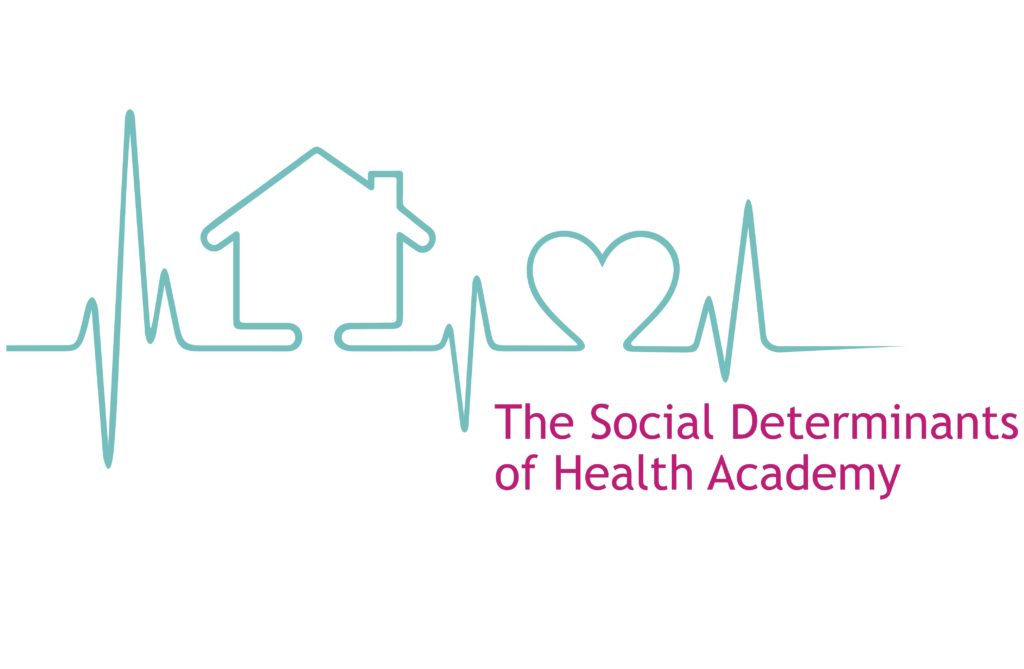 In 2017, we founded The Social Determinants of Health Academy, a collaborative involving 18 national organizations, also NTTAPs, partnering to offer free trainings to help health centers and their partners develop, implement, and sustain SDOH interventions in their clinics and communities.
In 2017, we founded The Social Determinants of Health Academy, a collaborative involving 18 national organizations, also NTTAPs, partnering to offer free trainings to help health centers and their partners develop, implement, and sustain SDOH interventions in their clinics and communities.
The National Center for Medical-Legal Partnership’s work was instrumental in a federal policy change at the U.S. Department of Health and Human Services that allows Federally Qualified Health Center to utilize their funding to support medical-legal partnership services.
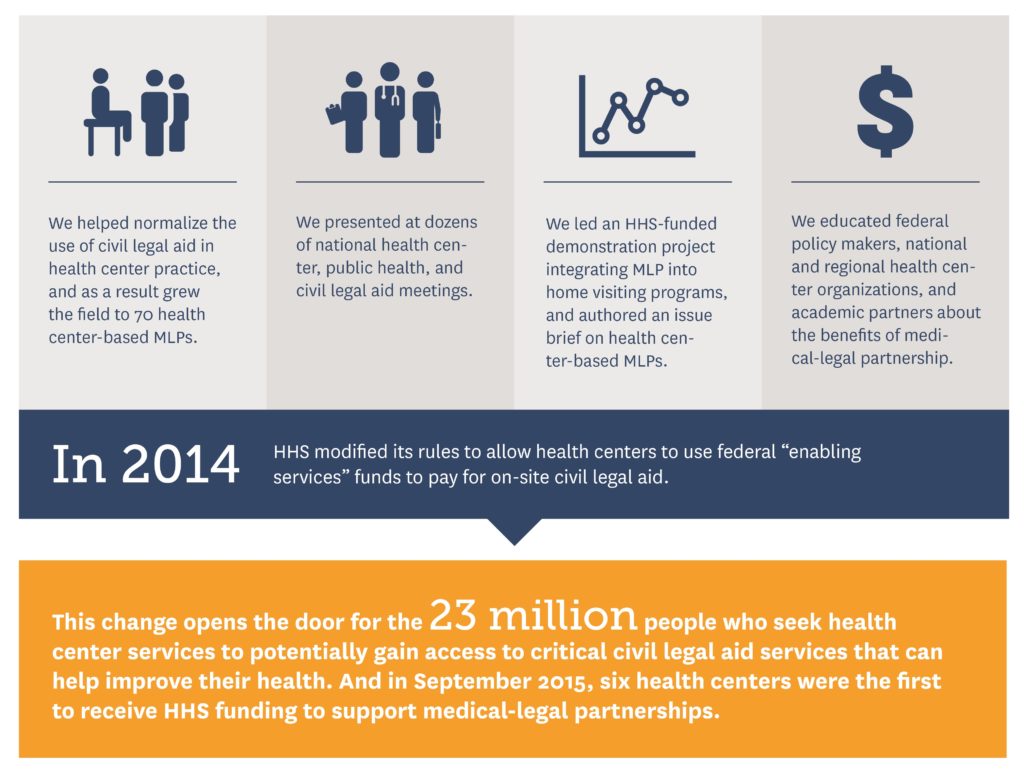 This 2014 policy change gave health centers a tangible way to support legal services in their clinics, while opening the door for the now over 30 million people who get their care at a health center to potentially have access to this life changing service.
This 2014 policy change gave health centers a tangible way to support legal services in their clinics, while opening the door for the now over 30 million people who get their care at a health center to potentially have access to this life changing service.
We’ve developed implementation guidance and performance measures that VA-based MLPs can use to gauge their impact on Veterans’ lives and health, and the efficacy of MLP services.
In May 2019, we convened 23 VA-based medical-legal partnerships alongside federal partners to explore opportunities to better coordinate health and legal services for Veterans. At that meeting, we released a readiness guide for VA Medical Centers with a step-by-step approach to starting and sustaining an MLP. In 2021, we developed additional implementation resources and performance measures for VA-based MLPs with a grant from the Bob Woodruff Foundation.

